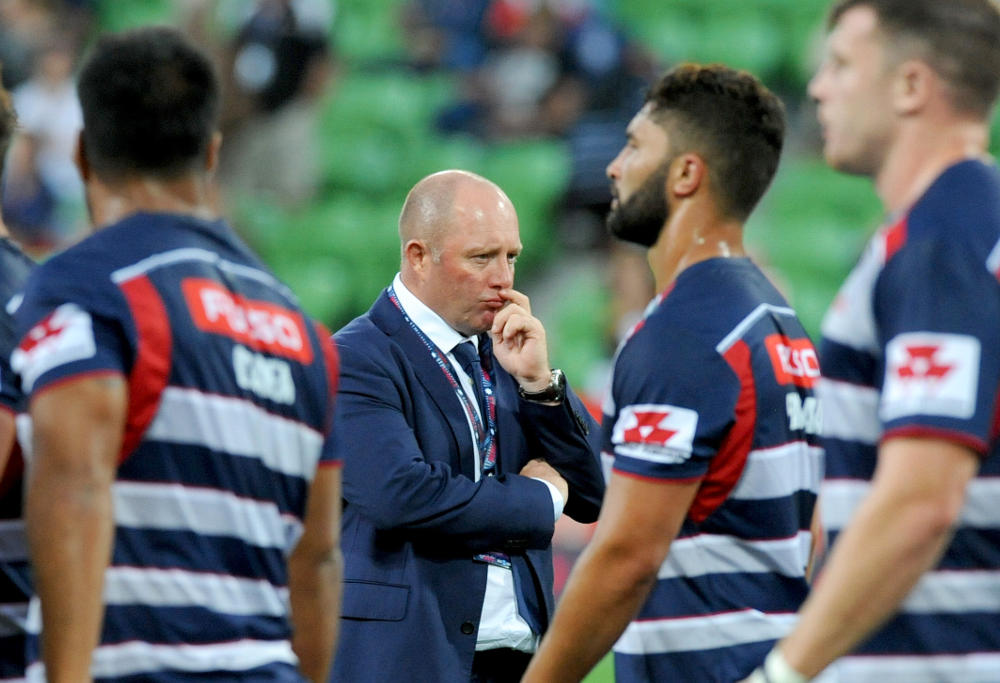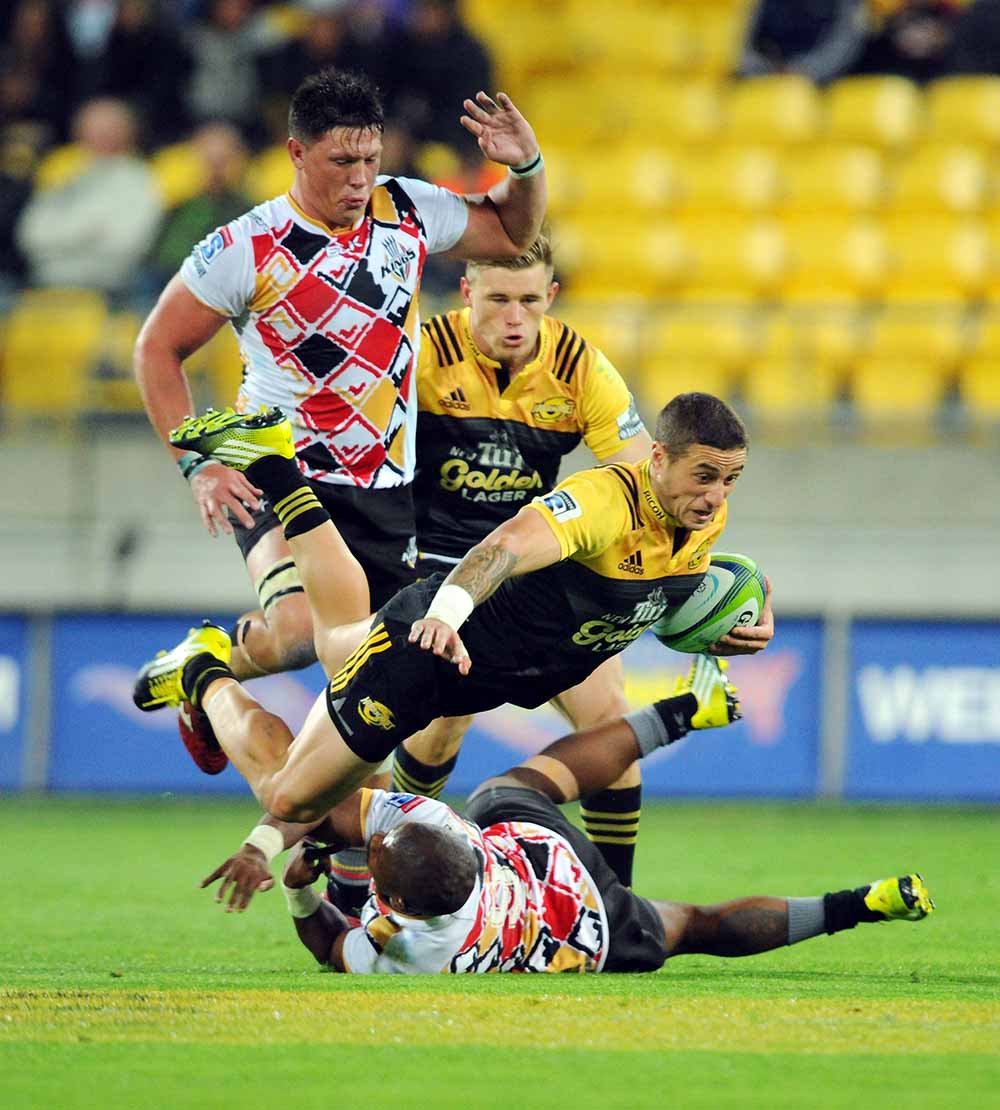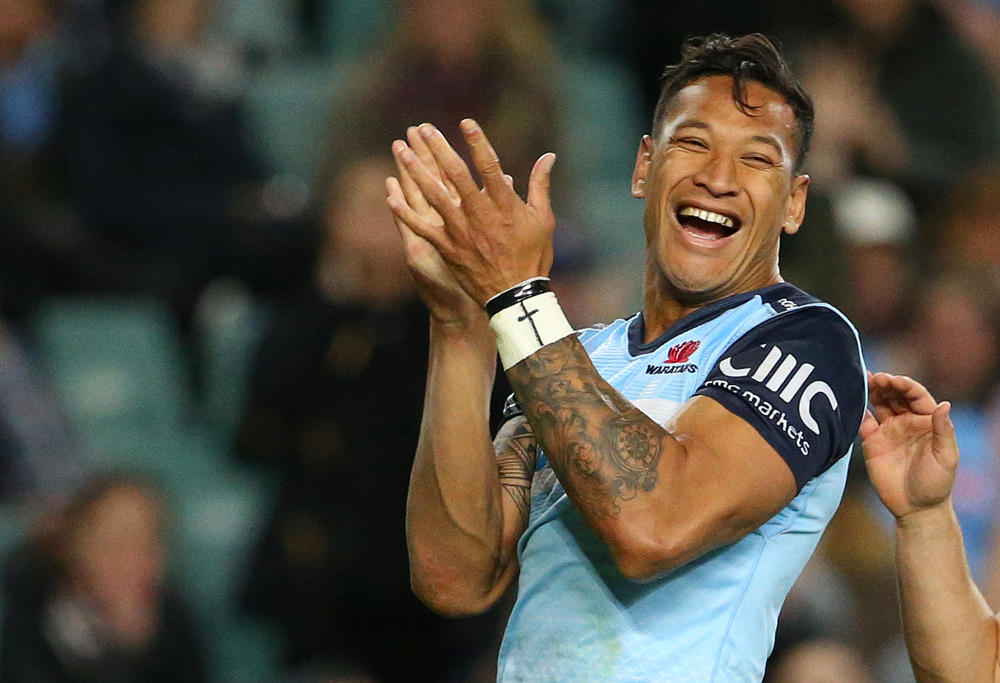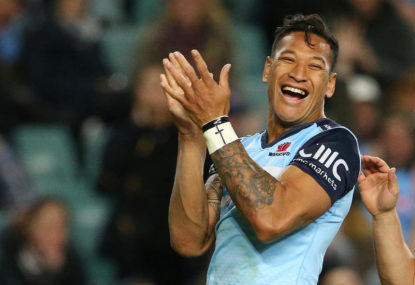No sooner had the Crusaders completed their 31-24 win over the Chiefs – a superb advertisement for both New Zealand and Super Rugby – Fox Sports front man Nick McArdle announced a new statement from the Melbourne Rebels regarding their continued presence in Super Rugby.
The contrast couldn’t have been starker. New Zealand’s best playing their hearts out in front of a stadium full of delighted, enthusiastic fans, versus Australian rugby fighting a pitched off-field battle through increasingly bitter legal threats, all the while falling further and further off the pace on the field.
To deal with the unsavoury first. After a fortnight’s grace for the Western Force while speculation swung towards the sale of the Rebels franchise back to the ARU, Rebels’ owner Andrew Cox shut that talk down with a statement so unequivocal one would be excused for thinking he is the most powerful man in Australian rugby right now.
It also made a nonsense of the reporting of whom I regard as Australia’s foremost rugby writer, The Australian’s Wayne Smith, whose coverage of this crisis has unfortunately been largely of the ‘rumour a day’ variety. Most of them have been conflicting and discarded as soon as the next one arrives.
One comment on Saturday by Smith was notable. “Essentially, Australia’s current rugby problems all derive from one simple question: Can the game sustain five Super Rugby teams?”
This statement couldn’t be more wrong and is the reason why everyone is unable to see beyond the current fog.
Australia’s rugby problems essentially derive from two sources.
1. Since the advent of professionalism in 1995, the game’s inability to construct and operate within a structure that simultaneously delivers positive outcomes for rugby at the professional (international, state/franchise), and amateur (club) level, and
2. The increasing disparity in financial strength between rugby in the northern and southern hemispheres, leading to higher numbers of talented players being lost from domestic rugby
The number of teams in Super Rugby and the convoluted conference structure and finals system that fans dislike and view as unfair? These are Super Rugby’s problems – SANZAAR’s problems if you like.

(AAP Image/Joe Castro)
The notion that Australia’s two core issues can somehow be resolved through fixing Super Rugby is flawed in the extreme. Conversely, it is these two deficiencies that make fixing Super Rugby so unpalatable and difficult.
For as long as these matters are confused and intertwined, the angst and destructive head-butting within Australian rugby will continue. And, as the Crusaders and Chiefs showed in Suva, the quality gap between Australia and New Zealand will continue to widen.
And while we’re on problems, what the Suva match showed is that, if anything, Super Rugby’s main impediment is actually a marketing problem. Not every match is of such quality of course, but no other rugby competition comes close to reproducing rugby of such intensity and skill so often.
In that respect, SANZAAR’s biggest failing is their biggest opportunity. How can they better connect to people within the existing rugby constituency, get them to take ownership of their game and have them eagerly anticipating more, week on week? And from there, how can they package it up and get it in front of potential new audiences, discerning enough to recognise and enjoy elite, best-of-the-best sport?
They would do worse than to copy what the AFL has done with their women’s competition. It is football so deficient and abjectly ordinary in its execution, dressed up and sold to media and fans so in love with and proud of their game, that they ignored any flaws and lapped up every minute of it.
Certainly the Suva crowd lapped everything up on Friday night. Fijians tend to follow their homegrown boys across Super Rugby and northern hemisphere club sides, and across sports too; loyalties with the player as opposed to the team.
In that context, they got great value from Seta Tamanivalu and Manasa Mataele, although it was a 22-year-old of Tongan heritage, Richie Mo’unga, who was the game’s dominant personality.
Mo’unga has already taken his game to another level this year, but he really came of age in this match, turning a dangerous Aaron Cruden attacking kick into a try at the other end, before breaking cleanly and keeping his head to create the decisive try to Ben Funnell, and coolly nailing seven from eight kicks at goal.
With All Blacks’ squad selection looming, several fringe candidates really stepped up, including the irrepressible Damien McKenzie, and Luke Romano, who might have edged himself ahead of Dominic Bird for a back-up lock position.
In Cape Town, the Blues unleashed a playmaker of their own, Charlie Faumuina expertly laying off passes for their first two tries, but then fell foul of an improved second half effort by the Stormers, and a confused, sub-par performance by referee Jaco van Heerden. Final score 30-22, Stormers.
Blues fans, along with SANZAAR’s referee’s assessor, will be wondering exactly how winger Matt Duffie was judged worthy of a red card, while the Stormers’ Shaun Treeby was merely penalised for a swinging arm that knocked Piers Francis cold and out of the game.
Van Heerden and TMO Shaun Veldsman also got themselves into a muddle in awarding the winning try to Sikhumbuzo Notshe, searching through the ‘double movement’ trees, while ignoring the ‘playing the ball on the ground’ forest right in front of their eyes.
One other thing from this match. Is there any more annoying sight in rugby than Blues hooker James Parsons taking an eternity to throw the ball into the lineout, cupping his hand to his ear, straining to hear the call? Either ditch the headgear son, or go to an audiologist, but get on with the game!
In Wellington, there was an eye-boggling kick pass from Seargel Petersen, weak defence from the Cheetah’s medic, and some confidence boosting goal-kicking from Beauden Barrett, as the Hurricanes coasted to a 61-7 win.
And TJ Perenara too, always one step ahead of the game, whether it be quick lineout throws, one on one steals, lightning switches of play or burrowing for tries.

(AAP Image/SNPA, Ross Setford)
In the battle of the weary travellers, the Force tired the earliest and hardest, falling to a 55-6 loss to that centre Billy Meakes described as “embarrassing”. So much for fleeting dreams of topping the Australian conference; there isn’t yet the quality in depth to adequately cover for a long injury list.
Highlander prop Aki Seiuli featured with a double, his second try courtesy of a channel created by a gridiron-style block disguised as a cleanout, the type of which we are seeing increasingly more of.
In the later match, referee Jaco Peyper mentioned to Brumbies captain Sam Carter that he was watching for this, so perhaps there is hope that the refereeing fraternity will work harder to define what is and isn’t acceptable at the cleanout.
The Highlanders also provided the individual highlight of the weekend, replacement prop Siua Halanukonuka positioning himself at fullback before busting a new move, the ‘laughing goosestep’, sparking a try 80 metres downfield to Dillon Hunt.
There was no atmosphere in the big stadium at Singapore, as the Sunwolves did their usual thing, battling hard before being outmuscled in the forwards by the Sharks. The final score was 38-17, three of the tries coming in the final five minutes.
It was business as usual too for the Bulls, no match for the Lions 51-14 who, for the first time in some weeks, got their ensemble game flowing again. From here they will coast to the finals, their only potential concerns being not enough intense rugby and the continued winning run of the Crusaders.
The Port Elizabeth home crowd has swelled noticeably in recent weeks, in line with the Kings’ improved results. While this is easily dismissed as ‘fair-weather bandwagon jumping’, the lesson (and hope) for Australian franchises is that fans have short memories, and when teams start winning a lot of problems go away.
Not that the Brumbies gave the home crowd much to cheer about, save for an early penalty try pimped by winger Makazole Mapimpi. They might also wonder why, in a low-scoring, defence-dominated match, their team refused to take an easy penalty for an eight-point lead midway through the second half, then meekly kicked the ball away anyway.
The Brumbies impressed by taking control of the game, dominating possession and not allowing the Kings many loose scraps to feed off, closing it out 19-10. Finally then, a win for an Australian franchise in South Africa. This leaves things open for the Waratahs to conquer the remaining territory next week.
If the Waratahs are to win in Dunedin, they’ll need to take the good parts of their game against the Rebels (fast recycle and straight running) and leave the bad ones at home (ill discipline). They’ll almost certainly not be fortunate enough to again be the beneficiary of two tries from forward transfers; although they were ultimately good value for their eight tries to three, 50-24 win, in what was a mostly entertaining match.

(AAP Image/David Moir)
The Waratahs game improved once the other players got onto the same wavelength as captain Michael Hooper. Early on, Hooper was forced to divorce himself from his team, effectively telling referee Angus Gardner ‘I’ve done all I can with this mob’.
Thankfully for the Waratahs, he continued to lead by example, his sheer combativeness and willingness to compete eventually inspiring others to follow.
One of those was Israel Folau, scoring a double in his best game of the season, and throwing in a few long overdue smiles as well.
The Rebels lost Reece Hodge in the first minute, which basically sums up their season. Hopefully, youngsters watching will be able to learn from Hodge’s awful technique in the tackle.
Their best, as he has been all year, was No.8 Amanaki Mafi. His reward was a first-half try and a date next weekend with the Crusaders. Rebels owner Andrew Cox might be kicking a few goals off the field but it certainly doesn’t get any easier for them on it.
Get in touch with a Daikin dealer today so you don’t sit and suffer through another cold winter while watching the rugby this year. Trusted by many and suitable for the Australian lifestyle, Daikin really is The Best Air Anywhere.
































































































